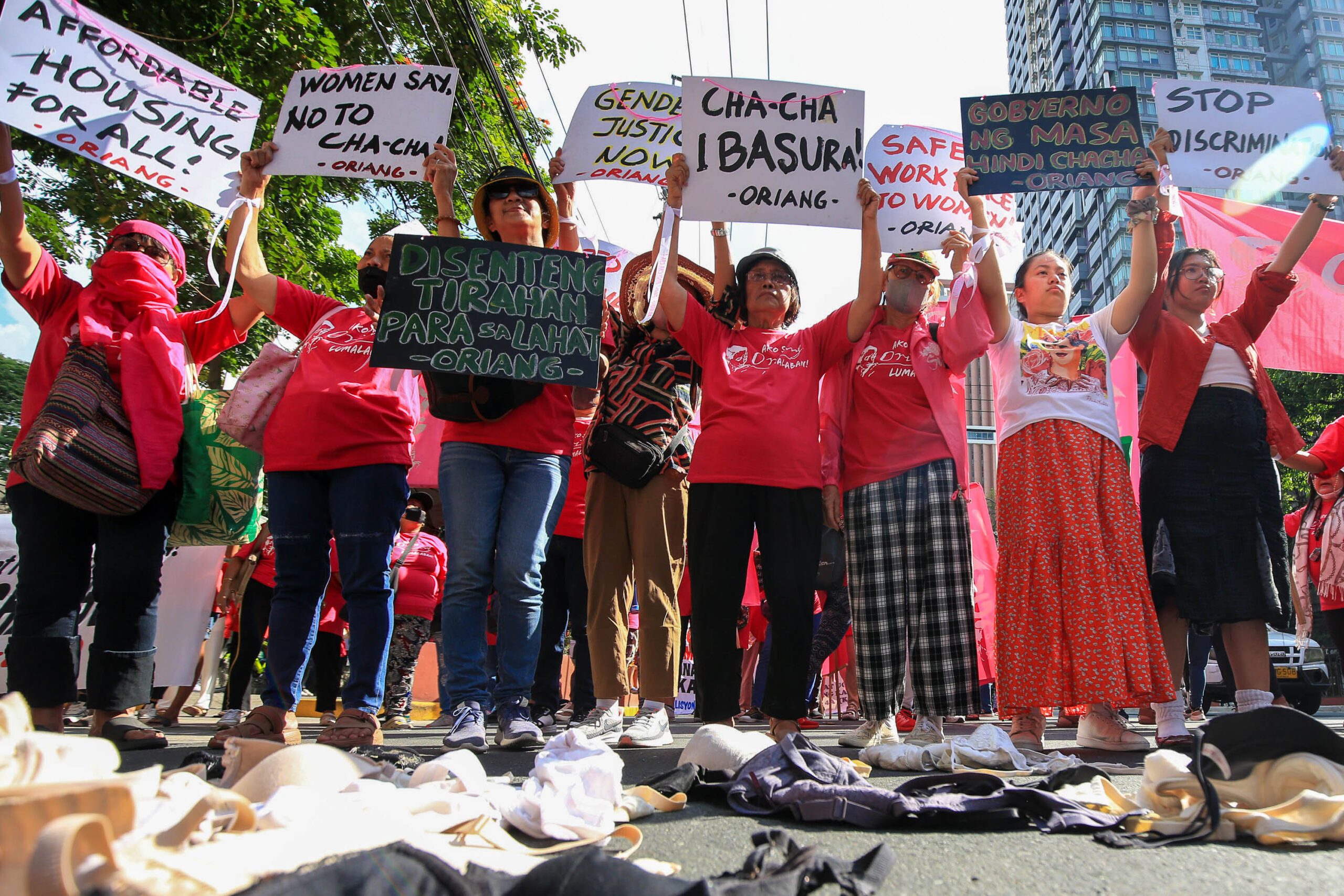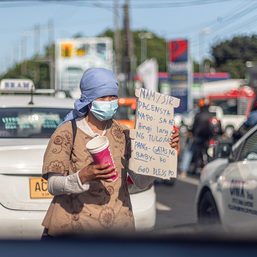SUMMARY
This is AI generated summarization, which may have errors. For context, always refer to the full article.

MANILA, Philippines – While the Catholic Church has shown to be progressive at times in its human rights agenda, it falls short, maybe even “backwards,” for issues that affect women’s welfare, according to Sylvia Estrada Claudio, former dean of the University of the Philippines Diliman College of Social Work & Community Development.
In a Rappler Talk episode aired on Friday, March 8, Claudio pointed out how the Catholic Church, the dominant religion in the Philippines, has been politically engaged in democratic issues that don’t necessarily focus on gender and women’s equality.
One example she said was the Church’s view on and participation in the Edsa People Power Revolution, when then-Manila Archbishop Jaime Cardinal Sin in 1986 called on Filipinos to join the movement that ousted dictator Ferdinand Edralin Marcos.
Another example Claudio mentioned was the Catholic Church’s condemnation of extra-judicial killings under former president Rodrigo Duterte. Father Flavie Villanueva, for instance, has been vocal in his activism against the violence.
But when it comes to progressive measures that could advance women’s rights, the Church has been known to block them – like divorce, abortion, and previously, the Reproductive Health (RH) Law.
“On certain issues that have nothing to do with women, they are progressive. But the social issues that affect women most, the Church has a very backwards social position in the Philippines,” said Claudio.
Claudio added that since Catholicism has already integrated into Philippine culture, a “conservative section of our society,” who may not necessarily be Catholics, subscribe to the Church’s opposition as this can be seen as aligned with culture as well.
“So in one sense, the Church is not a force for social progress, especially when it comes to women – it keeps us backward, and more importantly in its refusal to step back from interfering with the state,” she said.
Not to mention, Claudio added, the Catholic Church is itself a patriarchal institution that protects patriarchal culture.
A look back at the RH law
Before the 2012 passage of the RH Law, which became a breakthrough in ensuring women’s rights to sexual and reproductive health services like contraception, there was stark opposition from the Catholic Church.
According to nongovernment organization Catholics for Reproductive Health, the Church had campaigned against the RH Law for 13 years, claiming that it was “anti-family” and “anti-life,” and it would “encourage promiscuity among teenagers and proliferation of abortion among women.”
Claudio, who was part of the lobbying efforts for the RH Law when it was still a bill, said there was a point in time when many Filipinos were already for the bill and saw the need for access to contraceptives for family planning, but conservative congressmen stood on their so-called devotion to their religion.
“Democracy is hard when it’s like this. Because when your own congressman doesn’t listen to the people, and he does not read the Constitution, that’s our problem. But that’s really the power of the Church and its influence on legislation,” Claudio said in a mix of English and Filipino.
Politicians’ challenge: Defying the church
The late former president Benigno Aquino III defied Church pressure when he signed the RH Law in December 2012. But the Church was not done – church groups questioned its constitutionality at the Supreme Court. They eventually lost.
In the Rappler Talk episode, Rappler senior editor Chito dela Vega also pointed out how it is rare to come across politicians who will openly defy the Catholic Church.
Advocates said during the 2022 election period that when former vice president Leni Robredo was running for the presidency, one of the reasons she laid out conservative stances on issues like divorce and abortion was because she tried to court the Catholic church’s vote, aside from being a devout Catholic herself.
Still, a few who do have stances unaligned with the religious are still able to win. An example is Senator Risa Hontiveros, while openly Catholic, has still actively pushed for pro-women and gender equality measures.
“I feel the Church loses to women after a long struggle… I think we can change righteous, powerful institutions, but it takes time,” said Claudio, adding that there was also “growing acceptance” of progressive policies among the religious.
“I think power dynamics are part of it,” added Young Feminists Collective co-founder Shebana Alqaseer in the same Rappler Talk episode.
“The Church has so much power, elected officials have so much power, and… I hope someday we’ll have more feminist leaders in government, in legislative unit to push for this agenda,” said Alqaseer.
“We call on the church to think deeply about its own ministries… There are many interpretations the Church can use to accommodate women, and this goes not only for the Catholic Church, but other churches can allow women’s [rights] to happen,” said Claudio. – Rappler.com
Add a comment
How does this make you feel?
![[The Wide Shot] Peace be with China](https://www.rappler.com/tachyon/2024/07/wideshot-wps-catholic-church.jpg?resize=257%2C257&crop=311px%2C0px%2C720px%2C720px)
![[OPINION] A critique of the CBCP pastoral statement on divorce](https://www.rappler.com/tachyon/2024/07/TL-cbcp-divorce-statement-july-19-2024.jpg?resize=257%2C257&crop=285px%2C0px%2C722px%2C720px)


![[The Wide Shot] Was CBCP ‘weak’ in its statement on the divorce bill?](https://www.rappler.com/tachyon/2024/07/cbcp-divorce-weak-statement.jpg?resize=257%2C257&crop=258px%2C0px%2C719px%2C720px)
![[REFLECTION] Mary, Mother of the West Philippine Sea](https://www.rappler.com/tachyon/2024/07/may-mother-west-ph-sea-july-19-2024.jpg?resize=257%2C257&crop=293px%2C0px%2C751px%2C750px)
![[OPINION] Ignorance and prejudice](https://www.rappler.com/tachyon/2024/07/tl-ignorance-and-prejujdice.jpg?resize=257%2C257&crop_strategy=attention)






![[OPINION] Unpaid care work by women is a public concern](https://www.rappler.com/tachyon/2024/07/20240725-unpaid-care-work-public-concern.jpg?resize=257%2C257&crop_strategy=attention)
![[DECODED] The Philippines and Brazil have a lot in common. Online toxicity is one.](https://www.rappler.com/tachyon/2024/07/misogyny-tech-carousel-revised-decoded-july-2024.jpg?resize=257%2C257&crop_strategy=attention)


![[OPINION] Why women seek divorce](https://www.rappler.com/tachyon/2024/06/TL-women-seeking-divorce-june-14-2024.jpg?resize=257%2C257&crop_strategy=attention)
There are no comments yet. Add your comment to start the conversation.